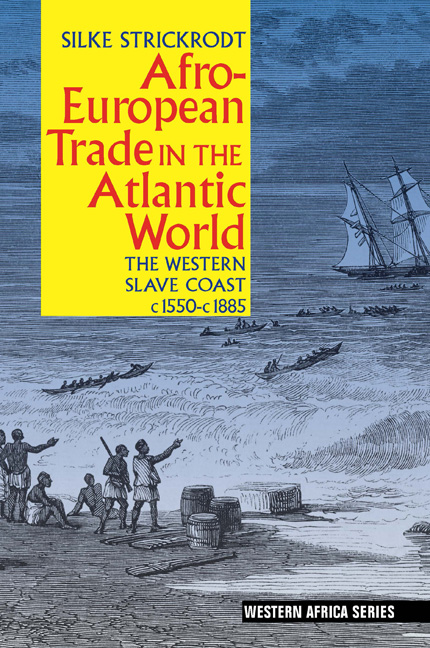Book contents
- Frontmatter
- Dedication
- Contents
- List of Maps
- List of Abbreviations
- Acknowledgements
- Map
- Introduction
- 1 The regional setting
- 2 The Atlantic connection: Little Popo & the rise of Afro-European trade, c.1600 to 1702
- 3 The era of the warrior kings: 1702 to 1772
- 4 The era of the traders: 1772 to c.1807
- 5 Disintegration & reconstitution: Political developments, 1820s to 1870s
- 6 From slaves to palm oil: Afro-European trade, c.1807 to 1870s
- Epilogue: The colonial partition & its consequences, 1870s to c.1900
- Bibliography
- Index
5 - Disintegration & reconstitution: Political developments, 1820s to 1870s
Published online by Cambridge University Press: 05 May 2015
- Frontmatter
- Dedication
- Contents
- List of Maps
- List of Abbreviations
- Acknowledgements
- Map
- Introduction
- 1 The regional setting
- 2 The Atlantic connection: Little Popo & the rise of Afro-European trade, c.1600 to 1702
- 3 The era of the warrior kings: 1702 to 1772
- 4 The era of the traders: 1772 to c.1807
- 5 Disintegration & reconstitution: Political developments, 1820s to 1870s
- 6 From slaves to palm oil: Afro-European trade, c.1807 to 1870s
- Epilogue: The colonial partition & its consequences, 1870s to c.1900
- Bibliography
- Index
Summary
The next two chapters both deal with the nineteenth century. This one discusses political developments and lays the groundwork for the discussion of commercial developments, which follows in Chapter 6.
The civil war of 1823 and the foundation of Agoué
The political disunity at Little Popo observed by European visitors in the late eighteenth century became more pronounced in the early nineteenth century. In the 1820s a civil war flared up at Little Popo, as a result of which Agoué was founded.
The main obstacle to the reconstruction of the history of this war is the scarcity of contemporary documentation. Earlier historians have relied mainly on retrospective accounts from local oral traditions, which exist in abundance. These accounts, which were recorded in writing in the early twentieth century, vary in detail and the point of view from which they are told. In essence, however, they tell the story that was first published by Pierre Bouche:
The foundation of Agoué dates only to the year 1821. A certain Feliz de Souza had a complaint about Comlagan, the chief of Petit Popo, and incited a revolt against him. Georges [Lawson], put at the head of this movement, succeeded in chasing away Comlagan. The latter established himself, with his followers, at Agoué and founded a small state where they have several times stood their ground, arms in hand, and asserted their independence.
Bouche's account appeared in 1885 but goes back to information gathered at Agoué in 1874/5. He does not give his sources, but probably received his information from people at Agoué, that is the descendants of the defeated party, some fifty years after the event.
On the basis of contemporary newspaper accounts, in the RGCG, however, Bouche's story is wrong in several points, most importantly regarding the date of the civil war and the identity of George Lawson's adversary. According to contemporary reporting, the war occurred in 1823 rather than 1821. Further, George Lawson's adversary is named as ‘Ansan’, the ‘caboceer of Dutch town’ at Little Popo, rather than Komlagan who according to Bouche was the ‘chief of Little Popo’.
- Type
- Chapter
- Information
- Afro-European Trade in the Atlantic WorldThe Western Slave Coast, c. 1550–c.1885, pp. 157 - 194Publisher: Boydell & BrewerPrint publication year: 2015



